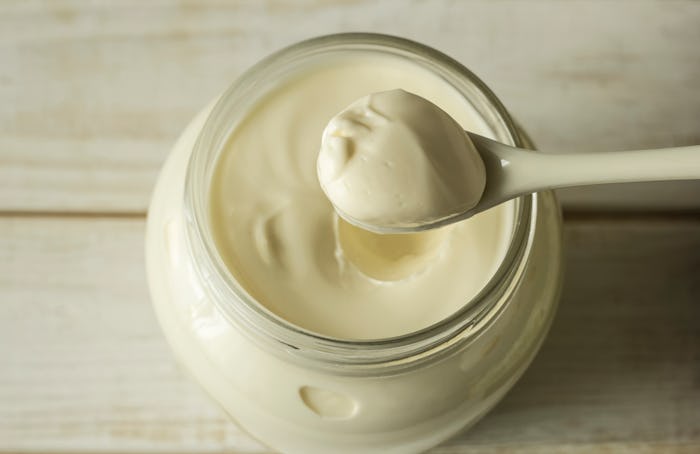Life

Before You Coat Your Kid's Lice-Infested Head With Mayo, Here's What You Should Know
Kids can be gross. Like, stick their fingers up their nose, forget to wash their hands after using the restroom, eat half a glue stick gross. Experiencing all of that disgustingness is just part of parenting. But another gross part of childhood that is almost unavoidable when it hits your child's classroom is the dreaded L-word — lice. Through no fault of their own, your kids can be exposed to lice and suddenly you find yourself trying everything under the sun to rid your child's hair of the unsightly bugs. You may try home remedies like mayonnaise to kill lice, because lets face it, lice treatment can be pricey.
But, can mayo kill lice? While researching this topic, my head began to itch just thinking about microscopic lice crawling around all over someone's head. Then, add in the discussion of using mayonnaise to suffocate the bugs and I feel like I may never use anything other than mustard on a sandwich ever again. I spoke with Krista Lauer, MD, National Medical Director for Lice Clinics of America to see if the old wives' tale holds any truth.
"Mayonnaise is one of the numerous home head lice treatments that are purported to eradicate an infestation. The truth — there are only spotty anecdotal stories and no scientific evidence that mayonnaise is effective," Lauer tells Romper. "Not only that, but the use could be dangerous."
Now, I know nobody wants to put their child in harm's way just to save a few bucks, but because there is so much misinformation about this particular topic right at your fingertips, Dr. Lauer explains exactly how this type of home remedy that seems harmless (I mean, you can eat mayo after all) can turn into a dangerous situation. "Once mayonnaise is applied to the hair, most people put something such as a shower cap or a bag over the head to protect their furniture and bedding. Sadly, there are stories of young children suffocating when the cap or bag slips," Lauer says.
So, now that you've ruled out mayo, what about other home remedies for lice? I have personally read about everything from peanut butter to saltwater washes once per hour, but Lauer says that according to science, these supposed shortcuts are a no-go. "No home remedies have been scientifically proven to be effective on a consistent basis, despite the number of testimonials for and against. From olive oil and mayonnaise, to Cetaphil and certain essential oils, many parents have spent precious money, time, and energy on treatments that simply don’t work," Lauer says.
Lauer says that there are treatments that can work to kill lice, but parents should be aware that such treatments will take time, and some over-the-counter treatments that used to work perfectly are no longer effective. "The over-the-counter pesticide-containing products are no longer effective. Lice have evolved and developed resistance to the insecticides in these products. These evolved lice are called Super Lice. Studies have shown that 98 percent of the lice in the U.S. are super lice." she says. "If you’re headed to the pharmacy, there are treatments that work, but be aware, no over-the-counter preparations kill lice eggs, despite their claims. All the effective treatments require two applications of product, 10 days apart. Look for a topical product that contains dimethicone. It is non-toxic and kills hatched lice. The Lice Remover Kit is one such product."
For treatment of these new super lice, Lauer recommends two types of FDA approved treatment. "There are safe and effective head lice treatments available for all budgets. The heated air technology in the FDA-cleared, AirAllé medical device is over 99 percent effective in eliminating a head lice infestation with a single treatment. This device is used by certified technicians in Lice Clinics of America Clinics. This same technology is found in the OneCure kit, which features a hand-held device for consumer use and is available at Lice Clinics of America clinics, and on Amazon," she says.
Ultimately, Lauer recommends choosing a treatment method for lice that will adequately remove the infestation, but wants parents to keep in mind that the lice themselves (although itchy and obnoxious) do not pose serious health risks. "The first and most important thing for parents and caregivers is don’t panic. Remember that head lice are common. It is also important to remember that head lice do not indicate poor hygiene. An infestation is not a reflection of the cleanliness of a person, their home, or their school." she says. "It is important to remember that head lice are not dangerous. They do not cause any serious, long term health problems, and they do not spread any diseases. Accordingly, chose a treatment wisely — one that is both effective and safe."